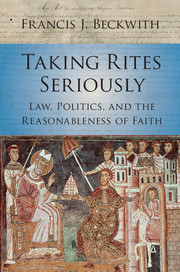Book contents
- Frontmatter
- Dedication
- Contents
- Acknowledgments
- 1 Introduction: Faith Seeking Understanding
- Part I Reason and Motive
- 2 Juris, Fides, et Ratio : What Judges and Some Legal Scholars Miss About Reason and Religious Beliefs
- 3 Theological Exclusionary Rule: The Judicial Misuse of Religious Motives
- Part II Dignity and Personhood
- Part III Nature and Sex
- Index
2 - Juris, Fides, et Ratio : What Judges and Some Legal Scholars Miss About Reason and Religious Beliefs
from Part I - Reason and Motive
Published online by Cambridge University Press: 05 November 2015
- Frontmatter
- Dedication
- Contents
- Acknowledgments
- 1 Introduction: Faith Seeking Understanding
- Part I Reason and Motive
- 2 Juris, Fides, et Ratio : What Judges and Some Legal Scholars Miss About Reason and Religious Beliefs
- 3 Theological Exclusionary Rule: The Judicial Misuse of Religious Motives
- Part II Dignity and Personhood
- Part III Nature and Sex
- Index
Summary
Secular theorists often assume that they know what a religious argument is like: they present it as a crude prescription from God, backed up with threat of hellfire, derived from general or particular revelation, and they contrast it with the elegant complexity of a philosophical argument by Rawls (say) or Dworkin. With this image in mind, they think it obvious that religious argument should be excluded from public life… But those who have bothered to make themselves familiar with existing religious-based arguments in modern political theory know that this is mostly a travesty …
Jeremy Waldron (1953–)Religious citizens, like their nonreligious compatriots, attempt to shape public policy in order to advance what they believe is the common good. Critics have suggested that there is something untoward with such activism, for the positions these citizens advocate are informed by their religious beliefs. Some of these critics ground this judgment in the claim that most (if not all) religious beliefs are by their very nature not amendable to rational assessment, and are thus irrational.
This view should not be confused with what is sometimes called Political Liberalism and often associated with the work of John Rawls and his numerous disciples. According to that view, policies informed by religious or secular comprehensive doctrines that limit the fundamental liberties of citizens who do not share those comprehensive doctrines are justified if and only if the coerced citizens would be irrational in rejecting the coercion. Rawls himself concedes that many of these comprehensive doctrines, including the religious ones, are reasonable. This is why Rawls distinguishes between reasonable comprehensive doctrines and the grounds by which the government may be justified in coercing its citizens. (In Chapter 7 I critically assess a Rawlsian approach to the debate over same-sex marriage.)
The focus of this chapter is on those who eschew Rawls's modest approach and argue that all religious worldviews are at their core unreasonable because they are dependent on beliefs not amendable to reason. The implication of this view – that some, albeit not all, proponents of it explicitly acknowledge – is that religiously informed policy proposals have no place in a secular liberal democracy that requires the primacy of reason.
- Type
- Chapter
- Information
- Taking Rites SeriouslyLaw, Politics, and the Reasonableness of Faith, pp. 13 - 52Publisher: Cambridge University PressPrint publication year: 2015

